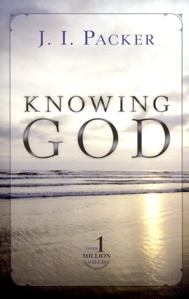"It is those who have sought the Lord Jesus till they have found him--for the promise is that when we seek him with all our hearts, we shall surely find him--who can stand before the world to testify that they have known God." - Page 32
How often do you ask yourself the question: Do I know God? This chapter begins where the prior chapter ends, pointing out the difference between knowing about God and actually knowing God. Packer's focus in this chapter is providing the evidence of one actually knowing God for themselves. He makes two strong arguments:
- One can know a great deal about God without much knowledge of him.
- One can know a great deal about godliness without much knowledge of God.
Packer uses David, along with Shadrach, Meshach and Abednego as an example of people who display the evidence of knowing God. He outlines this in 4 parts:
- Those who know God have great energy for God.
- "the people that know their God shall be strong, and do exploits" Daniel 11:32 KJV
- Knowing God should translate into having a passion for God and doing whatever it takes to walk in obedience to His Word. Those who know God take joy in Him, which results in them being strengthened, which then results in their ability to perform great works in His Name.
- Those who know God have great thoughts of God.
- Packer points out that our thoughts of God are often expressed through our prayer life, which he writes is "always the best evidence for a man's view of God". - Page 30
- People who know God carry a high regard for Him and esteem Him continuously within their mind.
- God is their treasure.
- Daniel displayed this all throughout his life, in his prayer, praise, devotion and witness of God before all who were around him, Jew and Gentile alike.
- Packer points out that our thoughts of God are often expressed through our prayer life, which he writes is "always the best evidence for a man's view of God". - Page 30
- Those who know God show great boldness for God.
- "Neither count I my life dear unto myself, so that I might finish my course with joy." - Acts 20:24 (Paul speaking)
- Showing determination, being unashamed of God, walking with a fear of God and not man, and taking risks for His Name's sake are all evidences that one knows the LORD.
- Daniel showed this in praying to the LORD openly by a window 3 times a day despite a decree stating that any man that prayed to anything other than a specific golden idol which was set up by Nebuchadnezzar would be put to death.
- Those who know God have great contentment in God.
- Those that know God have peace with God no matter what situation they find themselves in.
- Daniel and the 3 Hebrew boys showed this in one of my favorite passages of scripture, Daniel 3:13-17:
Then Nebuchadnezzar in furious rage commanded that Shadrach, Meshach, and Abednego be brought. So they brought these men before the king. Nebuchadnezzar answered and said to them, “Is it true, O Shadrach, Meshach, and Abednego, that you do not serve my gods or worship the golden image that I have set up? Now if you are ready when you hear the sound of the horn, pipe, lyre, trigon, harp, bagpipe, and every kind of music, to fall down and worship the image that I have made, well and good. But if you do not worship, you shall immediately be cast into a burning fiery furnace. And who is the god who will deliver you out of my hands?”
Shadrach, Meshach, and Abednego answered and said to the king, “O Nebuchadnezzar, we have no need to answer you in this matter. If this be so, our God whom we serve is able to deliver us from the burning fiery furnace, and he will deliver us out of your hand, O king. But if not, be it known to you, O king, that we will not serve your gods or worship the golden image that you have set up.”
They basically told the king that even if the LORD does not deliver them, they will still not bow down to a false idol. They were secure, even to suffering death in a firey furnace, that their God was real and would deliver them one way or another. They knew their God. As Paul, they "learned, in whatsoever state they were, therewith to be content." (Phil 4:11)
This chapter was a very powerful read. It has re-emphasised the importance of spending time with God and getting to know Him and not just know about Him - an area where I have struggled thus far in my Christian walk. I thank God for using brother Packer to write this wonderful chapter on what it means to bear the fruit of knowing God personably.

